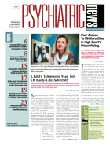Atypical antipsychotics were associated with worsening cognitive function at a magnitude consistent with one year's deterioration compared with placebo in Alzheimer's patients, according to a report published online May 15 in AJP in Advance.
A secondary analysis of the Clinical Antipsychotic Trials of Intervention Effectiveness—Alzheimer's Disease study (CATIE-AD) found that further cognitive impairment is an additional risk of treatment with atypical antipsychotics that should be considered when treating patients with Alzheimer's disease (see
Antipsychotics and Dementia Patients: Key Study Findings).
Lead author Lon Schneider, M.D., told Psychiatric News that the treatment of delusions and aggression in elderly patients with Alzheimer's disease is a clinical dilemma because there are no proven treatments that are effective, and in the absence of good alternatives, clinicians are using antipsychotics that are only marginally beneficial while having the potential to cause serious adverse effects.
And Schneider said the new analysis of CATIE-AD confirms what has been found in previous studies. For instance a study sponsored by Eli Lilly and Company and published in the International Journal of Geriatric Psychiatry in October 2005 found that when patients who did not have behavioral problems were randomized to olanzapine or placebo and followed for 26 weeks, patients receiving olanzapine experienced substantial impaired cognition.
"Several other studies have also shown a trend toward worsening cognition," he said. Schneider is a professor of psychiatry, neurology, and gerontology at the University of Southern California Keck School of Medicine.
The CATIE-AD study included 421 outpatients with Alzheimer's disease and psychosis or agitated/aggressive behavior who were randomly assigned to receive masked, flexible-dose olanzapine, quetiapine, risperidone, or placebo. Based on their clinicians' judgment, patients could discontinue the originally assigned medication and receive another randomly assigned medication.
Patients were followed for 36 weeks, and cognitive assessments were obtained at baseline and at 12, 24, and 36 weeks.
Overall, patients showed steady, significant declines over time in most cognitive areas, including in scores on the Mini-Mental State Examination and the cognitive subscale of the Alzheimer's Disease Assessment Scale. The decline was greater, however, for those receiving antipsychotic medication.
"Antipsychotics are at best marginally useful for treating patients with Alzheimer's who have mainly agitation, aggression, or psychosis," Schneider told Psychiatric News. "Some studies show some beneficial effects, but these come with a price that involves an association with death, stroke, risk for metabolic syndrome, and worsening cognition. The magnitude of this effect [on cognition] is of the same order of magnitude as the therapeutic effect of Aricept."
He added, "Physicians contemplating using antipsychotic medications for patients who are not responding to environmental and psychosocial interventions should be mindful of these effects and should consider discontinuing if patients do not respond."
APA President-elect Dilip Jeste, M.D., who reviewed the article, emphasized the lack of treatments approved by the Food and Drug Administration (FDA) for psychosis and agitation in patients with Alzheimer's and noted that atypical antipsychotics are commonly used in clinical practice to treat people with dementia, though this is not an FDA-approved indication. Complicating the clinical picture, he said, is that the FDA has issued black-box warnings about an increased risk of mortality with all antipsychotics, and about strokes with certain atypical agents in older persons with dementia.
"The present paper adds another troubling dimension in demonstrating worsening of cognition with these agents compared to placebo in dementia patients," Jeste told Psychiatric News. He is director of the Sam and Rose Stein Institute for Research on Aging and a professor of psychiatry and neurosciences at the University of California, San Diego.
"These results need to be taken into account in considering the risk-benefit ratio of atypical antipsychotics in individual patients with dementia," he said.
